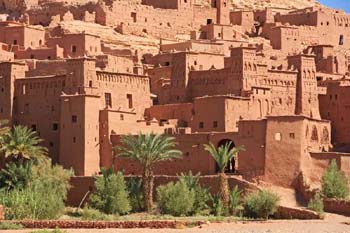
Euskara has never been in contact with the Berber dialects that are currently spoken in the Maghreb. However, it has similar words to the ones of those languages that perhaps were introduced in Euskara through the Iberian language.
According to the theory of the Proto-Basque expansion that took place after the last Ice Age, which is based on the most recent research on Archaeogenetics, those similarities could be due to migrations of Proto-Basque human groups to Africa. This ancient population could leave words and even Basque verbal morphemes during the miscegenation process with the Hamitic peoples of northern Africa that have been kept in their languages until the present day.
 Thus, it can be explained the existence of Basque words in Berber, Guanche (Canary Islands), Somali, Ethiopian and in old Egyptian (they are all Hamitic languages), as well as the vigesimal numeral system that is kept in the Tachelhit dialect of Berber.
Thus, it can be explained the existence of Basque words in Berber, Guanche (Canary Islands), Somali, Ethiopian and in old Egyptian (they are all Hamitic languages), as well as the vigesimal numeral system that is kept in the Tachelhit dialect of Berber.
Due to those similarities between Basque and Hamitic words, there was proposed the Basque-Berber theory which considered Euskara as related to Berber. This theory was abandoned some years ago since the similarities found were only lexical or lexicographical while they are very different today, as in the past, when concerning syntax and grammar. However, some similarities are observed especially in the verbal articulation as well as the usage of some particles, as stated above.
| Bereber |
Euskara |
English |
| Nekk |
Ni (nominative)
Nik (ergative) |
I |
| Akir |
Aker |
Goat |
| Aña |
Ania-Anai |
Brother |
| Aste |
Asto |
Donkey |
| Ma ism-k? |
Zein duk hire izena? |
What is your name? (male). When addressing to someone in Berber as well as in Euskara, the verbal particle that is used for this purpose changes depending on whether it is a man or a woman. In the masculine case, both Berber and Euskara use the particle -k. However, some researchers indicate that the particle used in Proto-Euskara was -ga. |
| Ma ism-m? |
Zein dun hire izena? |
What is your name? (female). In this case, Berber uses the particle -m while in Euskara -n is used. However, the researchers indicate that the particle used in Proto-Euskara was -na. |
| Adar |
Adar |
'Adar' means foot, leg in Berber while in Euskara it means branch, horn or extremity. |
Share this page!

 Thus, it can be explained the existence of Basque words in Berber, Guanche (Canary Islands), Somali, Ethiopian and in old Egyptian (they are all Hamitic languages), as well as the
Thus, it can be explained the existence of Basque words in Berber, Guanche (Canary Islands), Somali, Ethiopian and in old Egyptian (they are all Hamitic languages), as well as the